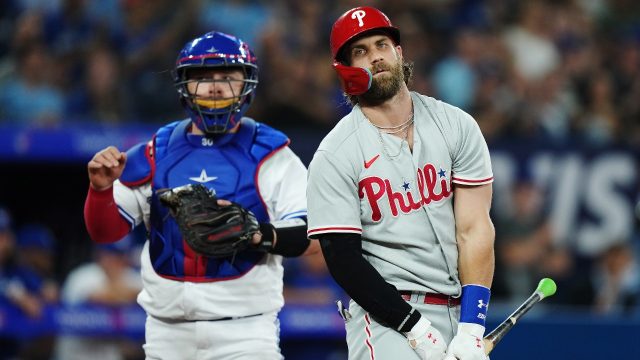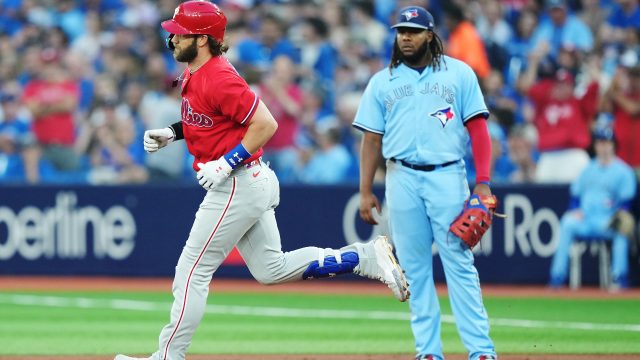
When the Toronto Blue Jays acquired Paul DeJong at the trade deadline, the hope was that he could raise the team’s floor at the shortstop position until Bo Bichette’s return from a knee injury.
Unfortunately for the Blue Jays, DeJong has produced the worst offensive stretch of his seven-year MLB career since joining the team.
Instead of closing the gap between the team’s existing backup shortstop options and Bichette — albeit by a fairly modest degree — DeJong has created a massive gulf between what the Blue Jays could’ve reasonably expected from their star shortstop and what they’ve gotten from the position lately.
Since Bichette’s last game on July 31, the Blue Jays have gotten a .115/.115/.135 line from their shortstops, good for a -43 wRC+. Unsurprisingly, that’s the worst number in the majors over that span with the 29th-ranked team — the Miami Marlins — producing a 9 wRC+.
In terms of raw production, Toronto has gotten six hits (five singles and a double), two runs, and three RBI from the position in more than half of a month. Those measures don’t perfectly capture offensive contributions, but here’s a comparison between them and what Bichette — who plays essentially every day when healthy — has averaged over the same number of games (15) in 2023.
|
Comparison |
Hits |
Runs |
HR |
RBI |
Total Bases |
|
Blue Jays SS since July 31 |
6 |
2 |
3 |
0 |
7 |
|
Bichette’s average production per 15 games |
20.4 |
7.1 |
2.4 |
8.4 |
31.4 |
At the very least the Blue Jays have probably missed out on a couple of runs via the long ball, and considering where Bichette hits in the lineup it seems fair to assume 14 more hits would’ve translated to a few more runs here and there.
If we want to get a bit more specific on that, there are two other ways to approach it. One would be via WAR. The differences between Bichette and DeJong vary depending on which WAR formula you use, and Santiago Espinal’s limited time at short in recent weeks is too small a sample to spit out a WAR total.
That means we’re estimating a bit here, but it still gives us a sense of what Toronto has lost.
|
Player |
bWAR |
fWAR |
|
DeJong as a Blue Jay |
-0.8 |
-0.9 |
|
Bichette’s average per 15 games |
+0.6 |
+0.5 |
|
Difference |
1.4 |
1.4 |
Whichever way you slice it you’re looking at 1.4 wins or approximately 14 runs. You can probably shave 0.1 or so off of that for Espinal, but we’re still looking at more than one win in the standings by overall production.
Another way to tackle this comparison would be to look at win probability added. That statistic doesn’t always paint an accurate picture of a player’s true talent, but it captures contribution to winning and that’s what we’re looking at here.
Since joining Toronto, DeJong’s WPA sits at -0.84. Meanwhile Bichette has generated approximately +0.19 per 15 games this season. That’s a difference of 1.04 wins, but Espinal’s contributions are easier to gauge here and his two strong games at short between Aug. 10 and Aug. 12 resulted in +0.30 WPA, putting the difference down to 0.74, or about three quarters of a win.
There is no perfect way to capture the difference between a star shortstop and a struggling fill-in over such a small period of time — especially without considering defence, which is borderline unquantifiable in such a small sample.
Even so, it seems fair to assume that Bichette’s absence has cost Toronto approximately one game in August. Considering the Blue Jays have taken three one-run losses in his absence, the right distribution of his hits might’ve made an even more pronounced difference.
We don’t know exactly what he would’ve done when, but we do know with almost ironclad certainty that he would’ve given Toronto more than it’s gotten since the beginning of August.
Just one victory is a massive difference considering a player who generates a win above replacement every 15 games is almost certain to win MVP. The bar was lower than replacement level for Bichette, but the fact it’s reasonable to ascribe that big an impact to his absence shows how good he’s been this season.
With the Blue Jays sitting just one game ahead of the Seattle Mariners in the battle for the last spot in the American League wild-card race, it’s clear the team needs Bichette back. The Blue Jays’ postseason fate could easily come down to a game or two, and their star shortstop’s absence has already taken a tangible toll.







